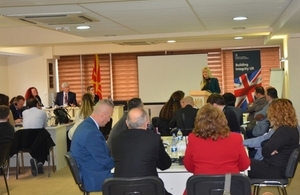Support to building integrity in Balkans defence and security
British Embassy Defence Section supports training for Western Balkan countries to tackle corruption risk in defence and security sectors.

Support to building integrity in Balkans defence and security
Corruption is being increasingly recognised as source of insecurity and has the potential to destabilise functioning governments but also to undermine fragile states and stability operations. UK is taking a leading role in trying to tackle the risk of corruption in defence and security.
In order to support Ministries of Defence in the region in building institutional and personal integrity, British Embassy Defence Section Skopje organised Building Integrity Foundation export course in March in Skopje. Over thirty participants from Macedonia, Kosovo and Albania from military, police, civil service and the civil service sector drawn from a wide variety of functional branches including procurement, strategic plans, policy, human resources and legal had the opportunity to learn about corruption risks and measures that can be used to reduce the risk of its effects within the defence and security sector.
The course was opened by Ms. Jacqueline Davies from the UK Defence Academy, Lt Col Richard Parry, UK Defence Attaché for Macedonia, Albania and Kosovo and State Secretary at the Macedonian Ministry of Defence Elizabeta Chupovska-Ristova.
In her address Chupovska-Ristova informed that the Macedonian Ministry of Defence was working on Integrity Plan aiming to create pool of experts and they would continue to implement continuous trainings on integrity for civilian and military personnel from the Ministry of Defence and the Armed forces. The State Secretary underlined that fight against corruption was never an easy and simple task. If not addressed trough preventative measures and continuous efforts, the risk of failure was always present and as senior manager she stated that she stood strong on that end. She added that considering the work that had been undertaken for the creation of the Integrity Plan, and the support Macedonia had been provided by NATO there should be no lack of capacity for developing pool of experts.
The course was deemed a great success by the UK Defence Academy course director Ms Jacqueline Davies. Delegates were fully engaged with significant input across the spectrum. They were particularly taken with the level of frankness and openness over the course with two thirds of participants stating the course fully met its aim.
Closing address and presentation of course certificates was made by the British Ambassador to Macedonia Charles Garrett.
The overall aftermath was that Macedonia should continue to be developed as a focus of best building integrity practice for the region and such courses should continue to be organized not only to provide delegates with valuable knowledge in the field of integrity development, but also to offer some practical tools for future commitments and opportunities to form a good network of peers.
Connect with us on Facebook and follow us @ukinmacedonia
Read our blog on UK in Macedonia